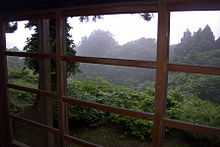| Saikan (斎館) | |
|---|---|
 A twisting hallway in Saikan. | |
| Religion | |
| Affiliation | Shinto |
| Location | |
| Geographic coordinates | 38°42′12″N 139°58′48″E / 38.703364°N 139.979944°E |
Saikan (斎館, Saikan) is a sprawling temple lodging atop Mt. Haguro (羽黒山 Haguro-san), part of the Three Mountains of Dewa (出羽三山 Dewa Sanzan) in Yamagata Prefecture, Japan. [1] It was previously known as Kezō-in (華蔵院). [2] [3]
It connects directly to the main temple of the complex through a long passageway that climbs further up the mountain. Elaborate Gohonbo Bassho-zen meals are served to visitors. Traditionally, it is reached by climbing up 2,466 stone steps up the side of the mountain, but it can also be reached by car or bus.
-
A simple breakfast.
-
One of many large tatami rooms for guests.
-
Hallway.
References
- ^ 岩鼻通明 (1992). 出羽三山信仰の歴史地理学的研究 (in Japanese). 名著出版. p. 3. ISBN 978-4-626-01430-6.
- ^ 日本の美術 (in Japanese). 至文堂. 2005. p. 84.
- ^ Earhart, H. Byron (1968). "The Celebration of "Haru-Yama" (Spring Mountain): An Example of Folk Religious Practices in Contemporary Japan". Asian Folklore Studies. 27 (1): 1–24. doi: 10.2307/1177798. ISSN 0385-2342. JSTOR 1177798.
External links
| Saikan (斎館) | |
|---|---|
 A twisting hallway in Saikan. | |
| Religion | |
| Affiliation | Shinto |
| Location | |
| Geographic coordinates | 38°42′12″N 139°58′48″E / 38.703364°N 139.979944°E |
Saikan (斎館, Saikan) is a sprawling temple lodging atop Mt. Haguro (羽黒山 Haguro-san), part of the Three Mountains of Dewa (出羽三山 Dewa Sanzan) in Yamagata Prefecture, Japan. [1] It was previously known as Kezō-in (華蔵院). [2] [3]
It connects directly to the main temple of the complex through a long passageway that climbs further up the mountain. Elaborate Gohonbo Bassho-zen meals are served to visitors. Traditionally, it is reached by climbing up 2,466 stone steps up the side of the mountain, but it can also be reached by car or bus.
-
A simple breakfast.
-
One of many large tatami rooms for guests.
-
Hallway.
References
- ^ 岩鼻通明 (1992). 出羽三山信仰の歴史地理学的研究 (in Japanese). 名著出版. p. 3. ISBN 978-4-626-01430-6.
- ^ 日本の美術 (in Japanese). 至文堂. 2005. p. 84.
- ^ Earhart, H. Byron (1968). "The Celebration of "Haru-Yama" (Spring Mountain): An Example of Folk Religious Practices in Contemporary Japan". Asian Folklore Studies. 27 (1): 1–24. doi: 10.2307/1177798. ISSN 0385-2342. JSTOR 1177798.
External links



